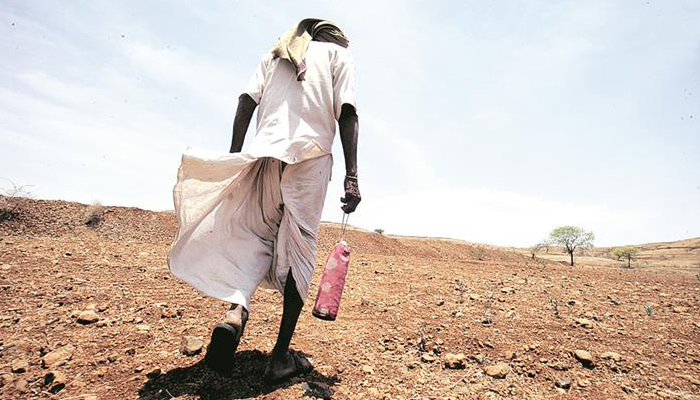TRENDING TAGS :
ODF case study: Ground reality is different from projection on paper in UP
ODF case study : Ground reality is different from projection on paper in UP
 Yogesh Mishra
Yogesh Mishra
Prime Minister Narendra Modi launched a laudable scheme in the country three years ago that was aimed at ending open defecation which was in common in semi-urban and rural areas. The scheme has made a good progress in some of the states. Uttar Pradesh is not one of them. What is worse, a lie has been spread by officials about some districts and rosy picture painted about its implementation.
An on- the- spot inquiry made by an international team and a study by a team of journalists working at Newstrack.Com and Apna Bharat in two districts, Varanasi represented by PM himself and Shamli, which was declared open defecation free district three months ago, have revealed this and some other facts. Both the districts were covered by the World Bank under its sanitation programme. The general impression is that the falsehood was spread to create larger-than life images of two officers, Amit Gupta who was posted in chief minister's office and Vijay Kiran Anand who is now incharge of the cleanliness mission.
Shamli's case stands out. The district was declared open defecation free district on March 10, a day before counting of votes polled in assembly elections. In the country as a whole out of 677 districts 141 have been declared so. An eight -member international team visited the UP district some time later to find that as many as 40 per cent houses had no lavatory and people living in those houses were forced to defecate in the open.
Members of the team spent their night out in villages and found to their dismay that a large number of villagers were still polluting the air . An inquiry revealed that only 55 to 60 per cent houses had latrine facilities which was contrary to the claim. The journalist team which visited some villages including Jalalabad and Kandhla were face to face with some other realities too.
The house owners in these villages who had dug the pit for lavatories were filling them as officials had not provided promised money to them. They were assured payments in two installments but even the first installment was not paid.
Gulab Singh in Jindana village confirmed that 30 to 40 per cent villagers had not changed their old habits. Sat Pal who is living in another village, Latifgad, told the team that the village Pradhan had approved 60 latrines and promised to pay Rs 5000 each after the pit was dug. He gave the amount to some of his men. When he approached him he was told that the scheme has been abandoned.
Another villager, Sabita, was given the same answer when she was contacted. An advocate living in the same area had another story to tell. He said he has visited the municipal office several times to construct " sauchalaya" during last two months but to no avail.
Councillor Ravindra Kashyap had had almost a similar tale to tell and informed that in his ward there are more than a dozen houses which are without the facility but an ODF ( open defecation free) certificate is being prepared for the ward. Municipal office employees evade questions regarding this.
Varanasi story is as interesting. When Vijay Kiran Anand was the district magistrate there the Water Supply and Sanitation collaborative Council (WSSCC), an international body, had offered to make the district open defecation free. It had promised to provide a sum of Rs five crore initially for the purpose. But the DM gave the assignment to the World Bank.The agency went for Saharanpur subsequently. A short film on it was shot later and shown in the United Nation.
Inquiry made has also found the claim of Vijay Kiran Anand that 201 villages in Varanasi have been made open defecation free untrue. The new DM of Varanasi did not believe his eyes when this factual report was given to him. If this can happen in PM's constituency anything can happen elsewhere.
The news team has visited some of the villages which were claimed to be open defecation free. These villages include Holapur, Niyardih and Mangolepur. In tribal dominated Holapur the latrines which have been constructed are not being used for lack of adequate water facility. According to Shakuntala Devi, there are only two hand pumps in the village which has a large population. These pumps are not even enough to quench thirst.
The team also found that number of latrines actually constructed in a village does not match with the number given in official document. The official document has a much larger number. This may be as true in case of villages in other parts of the state.
One also wonders why the state bureaucracy has preferred UN to WSSCC when the latter does not demand refund.
Uttar Pradesh has spent around Rs 3000 crores on the scheme but not even one district has been open defecation free so far. Sikkim on the other hand has four ODF districts, Kerala six, Chhatishgarh 14 and Gujarat 18. Uttarakhand has successfully implemented the scheme in almost all the districts, creating a record.
If like Bihar chief minister a physical verification is ordered by the new chief minister more startling disclosure may be made. What has hurt many so far is that despite reports of many wrong doings by Vijay Kiran Anand during his tenure as district magistrate of Varanasi, he has been appointed director of the cleanliness mission in the state.
(With inputs by Shyam Verma from Shamli and Ashutosh Singh from Varanasi)
Next Story



